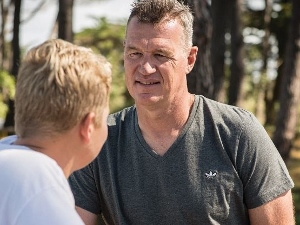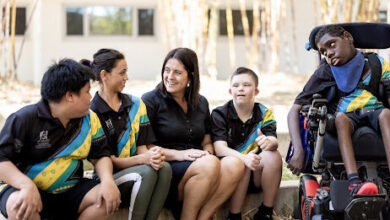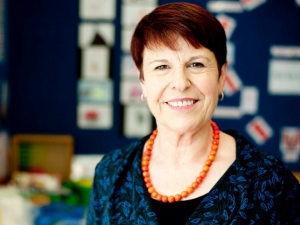John Kirwan – standing by troubled teens

 Former All Black, current Blues coach and front man for the depression awareness campaign, Sir John Kirwan has released a new book, Stand By Me, in which he focuses attention on teenage mental health issues. Written in collaboration with clinical psychologists Elliot Bell and Kirsty Louden-Bell, it examines how teenagers can be helped through times of anxiety and distress. School News spoke to Sir John during his recent book tour.
Former All Black, current Blues coach and front man for the depression awareness campaign, Sir John Kirwan has released a new book, Stand By Me, in which he focuses attention on teenage mental health issues. Written in collaboration with clinical psychologists Elliot Bell and Kirsty Louden-Bell, it examines how teenagers can be helped through times of anxiety and distress. School News spoke to Sir John during his recent book tour.
Q:
So John, what made you did you decide to write this book?
A:
I’m a parent and I’m scared. When I say that, I just want to be able to identify any mental health issues within my family and my child – parents guide him through that.
There’s some pretty big stats out there. From 13-18 are the risk times for children, when they possibly have their first experience with maybe some mental health issues. If you can jump on it then, you can really guide them to solutions and possibly it’s not an ongoing problem. It can be as young as 11, obviously later, but it seems to be adolescent time. So if we can notice that in our children we can really make a difference moving forward.
That’s what the book was all about – just about the opportunity to look into a whole lot of different situations to see if we can’t intervene and get positive outcomes.
I think the interesting thing talking to you is that teachers probably notice it a lot more than parents a lot of the time. A lot of the stuff written about in the book is about mood changes. Some of the mood changes go with adolescence.
Q:
So, How can you tell the difference between normal teenage moodiness and more serious problems?
A:
The interesting thing about the book – I never know where I’m going with these books and then I start. My idea was to come out with a tool box of A,B,C to help parents and caregivers and teachers. What I did come out with was a very different idea about what needs to be done – hence comes the title, Stand by me.
I think for us as parents and teachers it’s just actually making it OK. Having some understanding around it and realising some of these problems are definitely to do with mental health, depression and stuff like that.
I would also love to change the curriculum in New Zealand and have it as a subject. Mental health needs to be a subject and we need much more learning about it.
We teach them maths, science and English, so we need to be able to teach them about life’s twists and turns, how to deal with some of the harder times in life.
The other thing that’s really important to address is that suicide is not an option. It seems to be this word no one’s allowed to use. I go in to schools and I yell it, and I make them yell it, that suicide is not an option. It’s a long-term solution to a short-term problem.
The other thing I found out with the book is that I don’t know the world our kids are living in – it’s changing, fast moving, and it’s very, very difficult to understand what they’re going through.
Q:
Have you observed that it’s certain types of kids, like high-achieving kids or kids that are struggling that are more liable to have mental health issues?
A:
No. In my personal journey, I looked for reasons why for three years – it’s an illness not a weakness. That’s what I keep yelling. It’s like any other illness. Why do people get cancer – who knows? We’re spending millions of dollars trying to find out all this DNA stuff. For me it’s just an illness that can strike. I think there are some tendencies. I was a high achiever.
Q:
So is it high-achieving kids?
A:
No, it can be a whole lot of things. Problems at home. It’ll be some sort of trigger. You just need to stand by them and dig a wee bit. You just have to ask the questions. I talk about that in the book. Give them a pathway to be able to feel OK about it and understand they’re doing these things because maybe they’re not too well at the moment and they’ve got anxiety around stuff.
Q:
Apart from standing by them what other things should you do?
A:
You have to keep asking.
Q:
How do you get them out of it?
A:
If you can intervene quickly enough, then you get them help. Once you learn this illness then there are coping mechanisms you can learn.
There’s a really fantastic chapter about eating disorders where the mother talks about that. You treat the illness. Treatment might be anti-depressants, it might be therapy. The earlier we intervene the less severe it will be. So we teach them how to cope.
The idea of the book is to get it out there, get the intervention so we don’t have some of these more severe cases. So it’s OK. There’s a lot of stigma out there.
Q:
Do you think social media has any part to play in this?
A:
When I say I don’t know the world they live in, I don’t understand this whole situation. We don’t understand because society is moving so fast. We can’t do enough studies to keep up with it. It’s certainly changed the way they do things – cyber bullying, access to a whole of different stuff. There’s a real issue. But it’s not going to go away, it’s going to morph and change direction.
Q:
Do you think pressure from parents on their kids to achieve has any part to play?
A:
There are many and varied triggers that might trip it off. Like I said, it’s an illness. I looked for the triggers for me. Was it because I was famous, young, was it because the phone rang 54 times? In the end it is what it is. Some people might push their two other siblings and they might be fine. The third one might be a little bit different. It might be too much pressure.
You need to be aware of the signs and have ability to let them communicate back. Make sure it’s OK.
Q:
Is there a time frame for how long it takes to get well?
A:
Studies say the quicker you can intervene the quicker things get fixed. Like any other illness, if you make it normal, and there’s no stigma around it, you’ll be pretty good.
I’ve heard some amazing stories from young guys who’ve been really messed up but someone managed to get to them. They’re back on track. It’s been an episode in their life that’s a huge learning for them.
Q:
Has having the illness and getting through it made you more positive in your life?
A:
Yes. I’m incredibly happy. I’m well balanced. I understand my wellness. That’s really important. Wellness is every day. There are a few rules you can’t break.
Q:
What are those?
A:
You have to stay well. Search for your wellness. Mine’s reading. It could be cooking, all sorts of different things.
Q:
So for teenagers it’s something for them to focus on?
A:
Yes. Encourage them to understand themselves more.
Q
Are you going to write any more books?
A:
I don’t know. I didn’t think I was going to write this one.
Q:
How long did it take?
A:
About a year – I d been thinking about it for a couple of years. It’s the fear with a lot of people with mental issues, the fear of passing it on to kids. Dad passed heart disease on to us so it’s possibly hereditary, there’s a higher chance.
I also think if I have ability to parent it won’t be an issue If I had understood anxiety and learnt how to cope with it when I was younger I probably wouldn’t have fallen into depression.
Q:
How long did yours last?
A:
Part of journey of book has been taking a real good look back. I got homesick in Hunua at a school camp.
Q:
Isn’t it quite normal for kids to get homesick?
A:
But is that the first sign of anxiety? Question mark. I don’t have the answers to that. Possibly could be. If you fell over and hurt yourself on school camp you get first aid. If you’re homesick, what happens? You’re told to get over it. It’s just those questions. The answer might be yes it might be no. I certainly started having anxiety attacks later on, which led to depression. The two are very closely associated but you can have one without the other.
Q:
Once it’s sorted out is it, fixed for life or is it likely to recur?
A:
The likelihood of it reappearing depends on you, on your mental health. It’s a wide spectrum that goes from mild depression right through to schizophrenia and bipolar. I was sort of in the middle. I had medical depression. But I don’t take pills any more. I worked very hard on my wellness and I’m just not scared of it any more. If it comes back I know how to handle it.
Q:
Apart from travelling round talking about the book are you doing anything else? Have you thought about visiting schools?
A:
I’ve started going round to schools. I’m an ambassador with Westpac – they’re flying me into regions that have some challenging times. I’ve done two schools this month. A school in Wellington and a school in Alexandra and I’ve also been to a school in Feilding last month.
Q:
What sort of challenges?
A:
Suicides. Two of the schools have had suicides. I met the mother of the young man that committed suicide when I went to the school.
Q: That must have been tough?
A:
Yeah. She’s an amazing lady, she has really turned it into a positive – if you can.
First thing I said to her was, it’s not your fault.
Q:
Is it important for parents to realise that?
A:
It’s an illness that kills. They just call ours suicide. If it was any other illness that killed it would be a sad, sad death. It’s the tragedy that suicide leaves behind, it is devastating, tough. I just front it in schools. I get them yelling, “Suicide is not an option!”.
Q:
Do you think that’s helping?
A:
I don’t know. But I’m not going to stand by and do nothing. It’s like this word no one uses, they’re not allowed to talk about it.
Q:
Isn’t that because of the copycat scenario?
A:
Look, I don’t believe that. I believe it’s out there anyway. If you don’t talk about it, what are you going to do, hide it? Whether you like it or not it’s an issue. We have one of the highest suicide rates in the developed world. Whatever we’ve been doing up till now is not working. We might as well try something else.
I always ask the headmaster if it’s it OK if I front it up. I do a 40-minute presentation all about life, about how great life is.
Q:
Do you talk about your rugby career and being an All Black?
A:
No, they don’t remember me. They know me as the Blues coach. I’m the depression guy.









